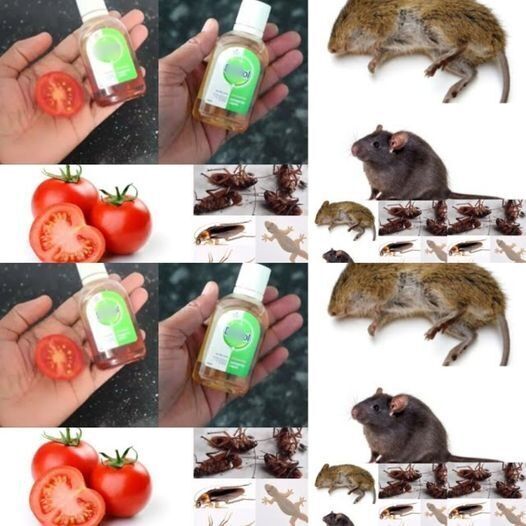ADVERTISEMENT
Top Natural Pest Control Remedies for Cockroaches
1. Boric Acid
Boric acid is one of the most popular natural remedies for cockroaches. It’s a toxic substance to roaches but safe for humans and pets when used correctly. The powder acts as a stomach poison to cockroaches when they ingest it, and it can also be absorbed through their exoskeletons. When cockroaches come into contact with the powder, they eventually die from dehydration.
How to Use:
- Lightly dust areas where cockroaches are likely to travel, such as behind appliances, under sinks, or in cracks and crevices.
- Make sure to apply it in thin layers, as thick layers can be ineffective.
- Avoid using boric acid in places where children or pets might come into contact with it.
2. Diatomaceous Earth (DE)
Diatomaceous earth is a fine powder made from fossilized remains of diatoms (microscopic algae). This natural substance is non-toxic to humans and animals but deadly to insects, including cockroaches. DE works by piercing the cockroaches’ exoskeletons, causing them to lose moisture and eventually die.
How to Use:
- Sprinkle diatomaceous earth in areas where roaches are likely to be, such as behind furniture, along baseboards, and in cracks and crevices.
- Leave it undisturbed for several days or until you notice a decrease in roach activity.
- Make sure to use food-grade diatomaceous earth, as other types can be harmful to humans and pets.
3. Essential Oils
Several essential oils have natural insect-repelling properties that can deter cockroaches. Some of the most effective oils for this purpose include peppermint, tea tree, eucalyptus, and lavender. These oils have strong scents that cockroaches find unpleasant and will avoid.
How to Use:
- Mix 10-15 drops of your chosen essential oil with water in a spray bottle.
- Shake well and spray it around areas where roaches are frequently seen, such as under the sink, around trash cans, and in cracks.
- You can also add a few drops of essential oil to cotton balls and place them in areas where cockroaches are a problem.
4. Bay Leaves
Bay leaves have a strong, pungent scent that repels cockroaches. When placed in areas where roaches are present, bay leaves can discourage them from entering or nesting there. Although bay leaves won’t kill cockroaches, they are an effective preventive measure.
How to Use:
- Place whole bay leaves in cabinets, drawers, and other areas where cockroaches are active.
- You can also crush the leaves to release more of the scent and place them near cracks or crevices.
- Replace the leaves every couple of weeks for continued effectiveness.
5. Cucumber Slices
Cucumbers contain a natural compound that repels cockroaches and other pests. Roaches dislike the smell of cucumber, and it’s said to be toxic to them in high concentrations. While not a surefire way to kill cockroaches, cucumber slices can help deter them.
How to Use:
- Place fresh cucumber slices in areas where cockroaches are active or suspected to be.
- You can place them in the kitchen, pantry, or along baseboards.
- Replace the cucumber slices every couple of days, as they will dry out.
6. Catnip
Catnip, known for its effect on cats, is also a powerful cockroach repellent. The active compound in catnip, called nepetalactone, repels cockroaches and other insects. It is a natural and non-toxic way to keep your home free from roaches.
How to Use:
- Place dried catnip in small sachets and place them in areas where cockroaches are a problem.
- You can also sprinkle loose catnip in cracks, behind furniture, or in the kitchen.
7. Salt
Salt can be a simple yet effective cockroach deterrent. It works by dehydrating the roaches when they come into contact with it. While salt is not a poison, it can help prevent cockroaches from making your home their permanent residence.
How to Use:
- Sprinkle salt in areas where roaches tend to hide, such as cracks and crevices, behind furniture, or near garbage bins.
- Be careful not to use excessive amounts, as salt can be difficult to clean up.
8. Soap and Water Spray
A simple soap and water spray can suffocate cockroaches by blocking their breathing pores. It’s an easy and inexpensive remedy to kill roaches on contact.
How to Use:
- Mix water and a few teaspoons of liquid dish soap in a spray bottle.
- Shake the bottle to mix the solution and spray it directly on cockroaches when you see them.
- The soap will coat the cockroach’s body and suffocate it, leading to its demise.
Preventing Future Cockroach Infestations
While these natural remedies are effective in controlling cockroaches, prevention is key to ensuring they don’t return. Here are some simple steps you can take to keep your home cockroach-free:
- Seal Entry Points: Cockroaches can enter through small cracks and gaps. Seal up any openings in doors, windows, and walls to prevent them from getting in.
- Keep Your Home Clean: Roaches are attracted to food and water. Clean up crumbs, spills, and food scraps, and avoid leaving dirty dishes in the sink overnight.
- Take Out the Trash: Make sure to empty trash cans regularly and use tightly sealed bins.
- Fix Leaks: Roaches are attracted to moisture, so repair any leaks in your home to eliminate potential water sources.
Conclusion
Cockroaches can be persistent, but natural pest control remedies offer an effective and safe way to tackle an infestation. Whether you use boric acid, diatomaceous earth, essential oils, or simple household ingredients like bay leaves and cucumbers, these natural solutions are not only safe for your family and pets but also environmentally friendly.
Incorporating these natural remedies, along with preventative measures such as sealing entry points and keeping a clean home, will help ensure that your space remains free from cockroaches. By choosing natural pest control, you can protect your home and family from harmful chemicals while effectively keeping unwanted pests at bay.
ADVERTISEMENT
